- Clone
- C363-16A (See other available formats)
- Regulatory Status
- RUO
- Other Names
- CD45RB
- Isotype
- Rat IgG2a, κ
- Ave. Rating
- Submit a Review
- Product Citations
- 15 publications
| Cat # | Size | Price | Quantity Check Availability | Save | ||
|---|---|---|---|---|---|---|
| 103307 | 50 µg | 59€ | ||||
| 103308 | 200 µg | 176€ | ||||
CD45RB is an isoform of CD45 with exon 5 splicing (encodes B determinant). It is a 220 kD glycoprotein expressed on peripheral B cells, naïve T cells, thymocytes, weakly on macrophages, and dendritic cells. It plays a critical role in TCR and BCR signaling. As T cells become activated and progress from naïve to memory cells, CD45RB expression is downregulated. Additionally, functionally distinct CD4+ T cell subsets, which secrete differing cytokine profiles, can be separated by CD45RB intensity. The primary ligands for CD45 are galectin-1, CD2, CD3, CD4 and Thy-1.
Product DetailsProduct Details
- Verified Reactivity
- Mouse
- Antibody Type
- Monoclonal
- Host Species
- Rat
- Immunogen
- Cloned mouse Th2 cell lines
- Formulation
- Phosphate-buffered solution, pH 7.2, containing 0.09% sodium azide.
- Preparation
- The antibody was purified by affinity chromatography, and conjugated with PE under optimal conditions.
- Concentration
- 0.2 mg/ml
- Storage & Handling
- The antibody solution should be stored undiluted between 2°C and 8°C, and protected from prolonged exposure to light. Do not freeze.
- Application
-
FC - Quality tested
- Recommended Usage
-
Each lot of this antibody is quality control tested by immunofluorescent staining with flow cytometric analysis. For flow cytometric staining, the suggested use of this reagent is ≤ 0.25 µg per 106 cells in 100 µl volume. It is recommended that the reagent be titrated for optimal performance for each application.
- Excitation Laser
-
Blue Laser (488 nm)
Green Laser (532 nm)/Yellow-Green Laser (561 nm)
- Application Notes
-
Additional reported applications (for the relevant formats) include: immunoprecipitation1, immunohistochemistry of acetone-fixed frozen sections and formalin-fixed paraffin-embedded sections.
- Application References
-
- Bottomly K, et al. 1989. Eur. J. Immunol. 19:617.
- Norian LA and Allen PM. 2004. J. Immunol. 173:835.
- Product Citations
-
- RRID
-
AB_313014 (BioLegend Cat. No. 103307)
AB_313015 (BioLegend Cat. No. 103308)
Antigen Details
- Structure
- Phosphatase receptor (CD45 gene exon 5), 220 kD
- Distribution
-
Peripheral B cells, naïve T cells, most thymocytes, low density on macrophages and dendritic cells
- Function
- Phosphatase, T cell development and activation
- Ligand/Receptor
- Galectin-1, CD2, CD3, CD4, Thy1
- Cell Type
- B cells, Dendritic cells, Macrophages, T cells, Thymocytes, Tregs
- Biology Area
- Cell Biology, Immunology, Inhibitory Molecules, Neuroscience, Neuroscience Cell Markers
- Molecular Family
- CD Molecules
- Antigen References
-
1. Barclay A, et al. 1997. The Leukocyte Antigen FactsBook Academic Press.
2. Trowbridge IS, et al. 1993. Annu. Rev. Immunol. 12:85.
3. Kishihara K, et al. 1993. Cell 74:143.
4. Pulido R, et al. 1988. J. Immunol. 140:3851. - Gene ID
- 19264 View all products for this Gene ID
- UniProt
- View information about CD45RB on UniProt.org
Related Pages & Pathways
Pages
Related FAQs
- What type of PE do you use in your conjugates?
- We use R-PE in our conjugates.
Other Formats
View All CD45RB Reagents Request Custom Conjugation| Description | Clone | Applications |
|---|---|---|
| FITC anti-mouse CD45RB | C363-16A | FC |
| PE anti-mouse CD45RB | C363-16A | FC |
| Purified anti-mouse CD45RB | C363-16A | FC,IHC-P,IHC-F,IP |
| APC/Cyanine7 anti-mouse CD45RB | C363-16A | FC |
| Alexa Fluor® 647 anti-mouse CD45RB | C363-16A | FC |
| PerCP/Cyanine5.5 anti-mouse CD45RB | C363-16A | FC |
| Pacific Blue™ anti-mouse CD45RB | C363-16A | FC |
| PE/Cyanine7 anti-mouse CD45RB | C363-16A | FC |
| APC anti-mouse CD45RB | C363-16A | FC |
| TotalSeq™-C1063 anti-mouse CD45RB Antibody | C363-16A | PG |
| Biotin anti-mouse CD45RB | C363-16A | FC |
| Spark Blue™ 550 anti-mouse CD45RB (Flexi-Fluor™) | C363-16A | FC |
| Spark Blue™ 574 anti-mouse CD45RB (Flexi-Fluor™) Antibody | C363-16A | FC |
| Spark Red™ 718 anti-mouse CD45RB (Flexi-Fluor™) | C363-16A | FC |
Customers Also Purchased
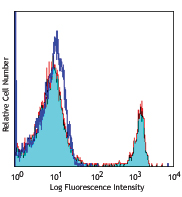
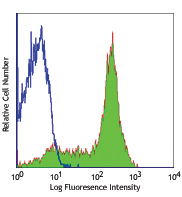
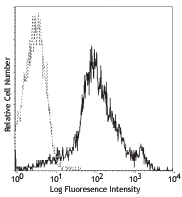
Compare Data Across All Formats
This data display is provided for general comparisons between formats.
Your actual data may vary due to variations in samples, target cells, instruments and their settings, staining conditions, and other factors.
If you need assistance with selecting the best format contact our expert technical support team.
-
FITC anti-mouse CD45RB
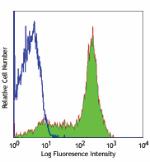
C57BL/6 mouse splenocytes stained with C363-16A FITC -
PE anti-mouse CD45RB
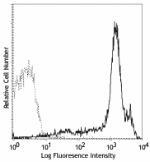
C57BL/6 splenocytes stained with C363-16A PE -
Purified anti-mouse CD45RB
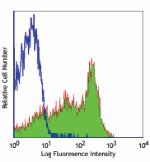
C57BL/6 mouse splenocytes stained with purified C363-16A, fo... -
APC/Cyanine7 anti-mouse CD45RB

C57BL/6 splenocytes were stained with CD4 FITC and CD45RB (c... -
Alexa Fluor® 647 anti-mouse CD45RB
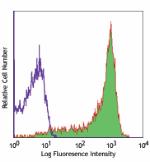
C57Bl/6 mouse splenocytes stained with C363-16A Alexa Fluor®... -
PerCP/Cyanine5.5 anti-mouse CD45RB
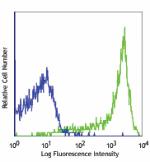
C57BL/6 mouse splenocytes stained with C363-16A PerCP/Cyanin... -
Pacific Blue™ anti-mouse CD45RB
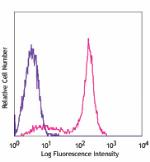
C57BL/6 splenocytes stained with C363-16A Pacific Blue™ -
PE/Cyanine7 anti-mouse CD45RB
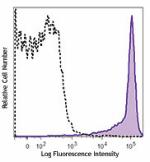
C57BL/6 splenocytes were stained with CD45RB (clone C363-16A... -
APC anti-mouse CD45RB
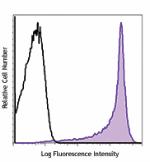
C57BL/6 splenocytes were stained with CD45RB (clone C363-16A... -
TotalSeq™-C1063 anti-mouse CD45RB Antibody
-
Biotin anti-mouse CD45RB

C57BL/6 splenocytes were stained with anti-mouse CD4 (clone ... -
Spark Blue™ 550 anti-mouse CD45RB (Flexi-Fluor™)
-
Spark Blue™ 574 anti-mouse CD45RB (Flexi-Fluor™) Antibody
-
Spark Red™ 718 anti-mouse CD45RB (Flexi-Fluor™)

 Login / Register
Login / Register 



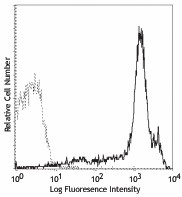








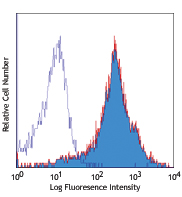







Follow Us